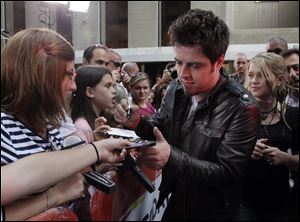
MUSIC
‘American Idol’ champ hits replay
8/26/2013
Lee DeWyze is back with a new album, “Frames.” Steeped in folk rock and none of the pop-rock frills that filled his major-label debut, DeWyze has the record he’s been longing to make.
For Lee DeWyze, being attached to the American Idol brand hasn’t yielded the best luck for a career. During the show’s 2010 season, in which northwest Ohioan Crystal Bowersox was the runner-up, the Mount Prospect, Ill., native won America over with his gritty voice and guitar strapped to his back. But the songwriter’s Idol triumph was underpinned by heavy criticism of the aging competition and it didn’t get better after the confetti fell on his victory song.
DeWyze’s post-Idol debut, 2010’s “Live It Up,” opened to weak reviews and the lowest first-week sales from any of the series’ previous winners. He eventually parted ways with his label, RCA. But the 27-year-old is looking to reverse some of that luck. After signing with indie label Vanguard Records last year, the singer is back with a new album, “Frames.”
Steeped in folk rock (he played the guitar, piano, mandolin, banjo, and drums on the album) and none of the pop-rock frills that filled his major-label debut, DeWyze has the record he’s been longing to make. Currently touring to launch “Frames,” DeWyze called to talk about the record.
Question: How long did you work on “Frames” and what has the response been from fans?
Answer: I’ve been working on this record for a year and a half now. Musically I knew what kind of album I needed to make. I wasn’t (trying) to make a folk-rock anthem record or a pop record. I just wanted to get in the studio and write and record.
Q: There’s been a stigma attached to your season. Do you feel you have to reintroduce yourself to audiences?
A: I think when my first album came out, it was “Oh, he’s the singer-songwriter guy.” But I think this album is really who I am. We didn’t write 100 songs and pick our favorite 13. I wrote maybe 20 songs. I dedicated my time to each. It feels real, and it feels like this album was made not because I had to, but because I wanted to. I wanted people to know what it is that I’m really about.
Q: “Live It Up” didn’t connect with audiences or critics. What didn’t work?
A: It was the time constraint. Working with a lot of different people in a small window of time — and everyone’s got an opinion. Sometimes, it’s like when you’re baking a cake, you don’t keep opening the oven. Everyone was great, it’s just such a small window. You do 40 songs in a couple of months. It becomes very ... disconnected.
Q: What has going from a major label to a smaller imprint allowed you to accomplish?
A: When RCA and I parted ways it wasn’t “What am I gonna do?” It was like I could breathe for a second. I just started writing. When I approached Vanguard they wanted to sign me based off the music, not because I was on Idol. They are a music label, they have music integrity. To be on a label like that was even more fuel to my fire.
Q: You’ve described this album as the one you “always wanted to make.” What’s different here, compared to your post-Idol debut?
A: When I came off of American Idol, that was obviously a great experience. I got to make a record. Let’s put it this way, I had to make a record when I got off of Idol. It’s not that I’m not proud of that record or I don’t appreciate it. I was able to write or co-write on all of those songs, and that’s great. I stand behind anything I put my name on. But at the time, to be honest, there were just too many cooks in the kitchen. And for me, I needed the space to be creative.